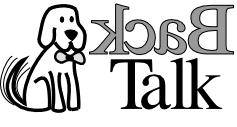
Smart Dog BackTalk FAQ
This FAQ answers common questions about all the Smart Dog BackTalk modules
(the ObEx Stack, the ObEx Transport, InterChange, and the
InterChange Convertor Modules).
My registration code doesn't work.
The registration code is tied to your Newton's name, either the name found in
Owner Info or the name found in
NewtonID.
The registration algorithm checks both codes; if either works, registration passes.
If you're not using NewtonID, check your current Owner Info name:
- Start the Notes application
- Click the Action (envelope) button, and choose Mail
- In the upper-left corner of the "mailing envelope" that appears
is your current Owner Info name and your current Emporium
(i.e. locale), formatted as a return address.
- Click the return address to choose the correct Owner Info name.
If that still doesn't work, download the Peekaboo package:
Run the Peekaboo program, and send the text to
smartdog@smartdogsw.com.
You can drag the text to the Newton clipboard and paste it into a note
for easier mailing.
Smart Dog Software will verify your registration, and send a new
registration code.
I get a crash while running!
Besides the standard information, a
BugTrap
log is very useful in determining remotely exactly what went wrong.
Please send instructions on reproducing the error, plus a BugTrap log
(if available), to smartdog@smartdogsw.com.
What devices have been tested with Smart Dog BackTalk?
See the list of supported devices.
Will Smart Dog BackTalk run on my Newton MP130/MP120/MP110?
Unfortunately, no. Although many of the components of the BackTalk system will run
just fine on Newton 2.0, the BackTalk ObEx Stack itself requires IrDA hardware. Although
the MP130, MP120, MP110, and even the original MP100 supported infrared beaming, their
beaming hardware is not compatible with the IrDA standard (which, to be fair, was finalized
after these devices were produced).
How can I add translation capabilities to my system?
First, see if a translator module already exists.
If there is none, a developer may write a new translator to the
InterChange interface. This interface is planned to be published
in June 2000.
Can I write my own applications using IrDA IrOBEX protocol?
Yes! Any application can access the BackTalk ObEx Stack prototypes and
functions through a unit interface. This means that new applications,
like backup applications or other forms of file transfer, may be
written without requiring the end user to license the BackTalk ObEx Stack
again.
The unit interface is currently planned to be published in July 2000.
Will Smart Dog support other communications standards for the Newton?
Smart Dog is currently considering the implementation of additional protocols
for the Newton, including
IrDA IrCOMM infrared
serial communications protocol;
product plans for such depend on the acceptance of and demand for infrared
communications products in the Newton marketplace.
Can I use the same registration code for upgrades?
It is Smart Dog's policy to never charge for upgrades. Although the purchase price
for newer, more complete versions of software may increase, customers who already
own the software will not be charged for upgrades.
The same registration codes will work for all versions of any given Smart Dog
program. In fact, you shouldn't have to re-enter registration codes; upgraded
software will find the old registration codes automatically.
Why does BackTalk use a separate process to translate incoming data? It's
tedious to have to translate each item by hand.
Delayed translation is important for those translators (e.g. the HP CapShare translator)
which are very slow; if automatic translation were to occur, the Newton would "freeze" after
receiving such an item until translation were complete.
So in the first release we separated receiving from translating. We will soon
support an option to translate automatically; that should operate as most wish.
Multiple address defect
When beaming a Name card with multiple addresses to a Palm device, the Palm
would not understand what to do with the extra addresses, and would reset.
This is fixed in version 1.02 of the Palm Translators. Extra
addresses are now sent as text in the Notes field of the Palm card.
Multiple e-mail address defect
When beaming a Palm AddressBook entry with multiple e-mail addresses to
a Newton, the Newton could create a corrupt entry that could not be viewed
in the InBox, and which could prevent the opening of the Names application
if the card were to be put away.
This is fixed in version 1.02 of the Palm Translators.
Poor 8-bit character support
When beaming names between Palm devices and Newton devices, 8-bit characters
would often be corrupted with version 1.01 and earlier of the Palm Translators.
This is fixed in version 1.02.
For more information
[an error occurred while processing this directive]
This page was last modified on October 05, 2001.